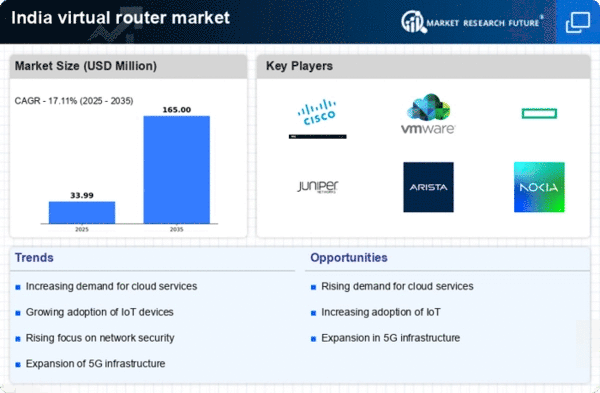Rising Demand for Remote Work Solutions
The virtual router market in India experiences a notable surge in demand due to the increasing prevalence of remote work solutions. Organizations are increasingly adopting virtual routers to facilitate secure and efficient connectivity for remote employees. This shift is driven by the need for reliable network performance and enhanced security measures. According to recent data, the remote work segment is projected to grow by approximately 30% annually, indicating a robust market opportunity for virtual router providers. As businesses seek to optimize their network infrastructure, the virtual router market is likely to benefit from this trend, positioning itself as a critical component in the evolving landscape of remote work solutions.
Growing Focus on Cost Efficiency in Networking
Cost efficiency remains a pivotal driver for the virtual router market in India. Organizations are increasingly seeking solutions that reduce operational costs while maintaining high-performance standards. Virtual routers offer a compelling alternative to traditional hardware routers, as they can be deployed on existing infrastructure, minimizing capital expenditures. This shift towards virtualization is expected to result in a market growth rate of approximately 20% over the next few years. As businesses prioritize budget-friendly networking solutions, the virtual router market is likely to gain traction, appealing to a wide range of industries looking to optimize their networking expenditures.
Government Initiatives for Digital Transformation
Government initiatives aimed at digital transformation in India are likely to propel the virtual router market forward. Programs such as Digital India emphasize the need for robust digital infrastructure, which includes advanced networking solutions. The government's commitment to enhancing connectivity and promoting technology adoption across sectors creates a favorable environment for virtual router deployment. As public and private sectors align with these initiatives, the virtual router market may witness increased investments and innovations. This alignment could lead to a projected growth rate of around 25% in the coming years, reflecting the market's potential in supporting India's digital transformation goals.
Expansion of Internet of Things (IoT) Applications
The proliferation of Internet of Things (IoT) devices in India significantly influences the virtual router market. With an estimated 1.5 billion IoT devices expected to be operational by 2025, the demand for efficient network management solutions is paramount. Virtual routers play a crucial role in managing the connectivity and data flow of these devices, ensuring seamless communication. The virtual router market is poised to capitalize on this growth, as organizations increasingly rely on these technologies to support their IoT initiatives. The integration of virtual routers into IoT ecosystems may enhance operational efficiency and drive further adoption across various sectors, including manufacturing, healthcare, and smart cities.
Increased Need for Scalability in Network Solutions
The virtual router market in India is significantly influenced by the growing need for scalability in network solutions. As businesses expand and evolve, their networking requirements become more complex. Virtual routers provide the flexibility to scale network resources dynamically, accommodating fluctuating demands without the need for extensive hardware upgrades. This adaptability is particularly appealing to startups and SMEs, which often face budget constraints. The market is projected to grow by around 22% as organizations recognize the advantages of scalable networking solutions. Consequently, the virtual router market is well-positioned to address the challenges posed by rapid business growth and changing technological landscapes.
















